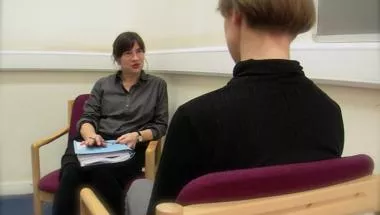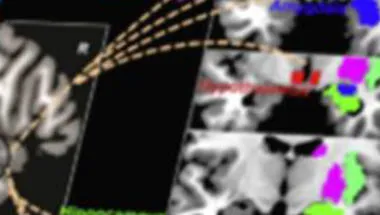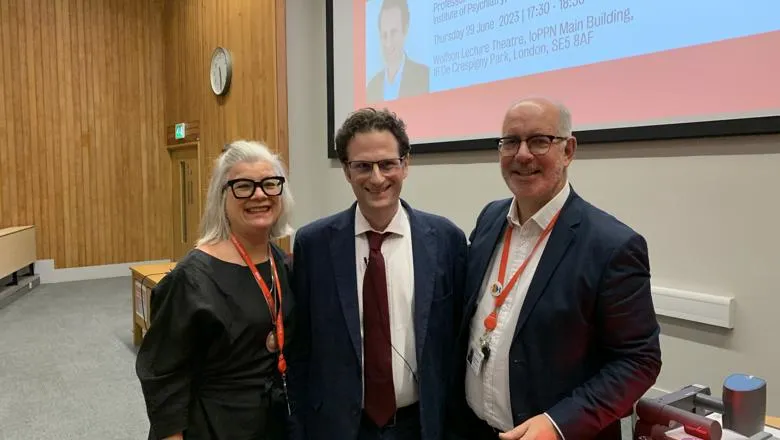
Roland Zahn
Professor of Mood Disorders & Cognitive Neuroscience
Research interests
- Psychiatry
Biography
I have joined the Centre for Affective Disorders at the Institute of Psychiatry, King's College London in 2013. I am Deputy Lead of Psychosis and Mood Disorders Theme at the NIHR Maudsley Biomedical Research Centre.
Clinical background
On completing my specialist training in general psychiatry and cognitive behavioural psychotherapy at Freiburg University in 2007, I have undertaken top-up training in old age psychiatry and worked since 2011 as an honorary consultant psychiatrist in the cognitive assessment clinic and the specialist service for affective disorders at South and Central Manchester University Hospitals. My clinical expertise is in treatment-resistant affective disorders, as well as differential diagnosis and treatment of cognitive and organic affective disorders. Since joining King's Health partners, I have been an Honorary Consultant Psychiatrist at the South London and Maudsley NHS Trust. I am currently running a new pilot service specialising in mood disorders in primary care following the consultation liaison model and am one of the consultant psychiatrists in the National Service for Affective Disorders at the Maudsley Hospital.
Educational background
I studied medicine at the Universities of Heidelberg and Aachen in Germany and completed my doctorate thesis on the clinical neuropsychology and neuroimaging of subcortical haemorrhages at University of Aachen in 1999.
Scientific biography
As a specialist trainee in neurology, I became interested in the neural basis of conceptual knowledge, which allows us to understand the meaning of objects and behaviour. Using fMRI in aphasic stroke patients, we showed a considerable degree of take–over of function within left-hemisphere areas, which contradicted dominant models of right hemispheric compensation. On continuing my clinical training in psychiatry at Freiburg University, I investigated the neural basis of conceptual knowledge in patients with neurodegenerative disorders providing support for the importance of the anterior temporal lobe in Alzheimer’s disease.
During my training in psychiatry and cognitive-behavioural psychotherapy, I became aware of the potential importance of the neuroscience of conceptual knowledge in understanding depression, which has been classically studied from the perspective of emotion research. While there was already a growing literature on the neural basis of general conceptual knowledge, the neural basis of conceptual knowledge of social behaviour (i.e. social concepts such as ‘stingy’, ‘tactless’, ‘honourable’), which is of eminent interest to psychiatry, was unknown. Funded by a postdoctoral fellowship from the German National Academy of Sciences, I pursued this question at the National Institutes of Health (NIH) in Bethesda. Using fMRI, we were able to identify a subregion within the anterior temporal lobe, that was selectively activated for social relative to non-social concepts [1]. We further provided definitive evidence for its necessary involvement in representing social concepts by showing selective impairments on social relative to non-social concepts in patients with right anterior temporal lobe neurodegeneration [2]. In addition, we demonstrated the involvement of the anterior temporal lobe in the neural representation of values and moral emotions such as guilt [3]. We were also the first to show that the subgenual cingulate region, known to be of key importance for major depression, was selectively activated for guilt [3,4]. Together with my supervisor Jordan Grafman, and my colleague Jorge Moll at the NIH, I formulated an influential model of moral cognition and emotion which, contrary to other models, incorporated a prominent role of social concepts [5,6]. This work has provided the foundation for a novel approach to the study of depression, which I have pursued at Manchester University, first supported by an internal award (Stepping Stone Fellowship) and from 2011 by an MRC Clinician Scientist Fellowship. This has led to our identification of the first neurocognitive mechanism explaining excessive self-blame and self-worthlessness in major depressive disorder. As predicted from my earlier work, the anterior temporal lobe showed a functional decoupling from the subgenual cingulate cortex while patients with major depressive disorder experienced guilt [7]. Despite the theoretical importance of guilt and self-blame, first highlighted by Freud, their neural basis in depression was previously unknown. Our research filled an important gap in the understanding of how neurobiological and psychological mechanisms interact to produce distinctive symptoms of depression.
Based on this finding, during my MRC fellowship, continued at King's College, we have developed the first robust fMRI signature of recurrence risk in major depressive disorder that is able to make individual predictions [8].
Since 2010, I have been an honorary principal investigator and advisor to the newly formed D’OR Research Institute in Rio de Janeiro headed by Jorge Moll. We have recently been able to show that affiliative emotional qualities, crucially important for guilt and sympathy, are selectively represented within the septo-hypothalamic area irrespective of hedonic value (positive or negative)[9]. This was the first study to demonstrate that the neural basis of affiliative feelings can be separated from other emotions. My collaborator Jorge Moll is leading efforts to develop neurofeedback interventions which are aimed at enhancing affiliation.
In Rio de Janeiro, we have used a newly developed neurofeedback software FRIEND
(available as a free toolbox for FSL:
to probe whether people with remitted major depression can increase coupling between the anterior temporal and the subgenual regions:
http://clinicaltrials.gov/ct2/show/NCT01920490
Based on the technical proof-of-concept provided in this trial, I have obtained funding for an fMRI neurofeedback study (NARSAD independent investigator award) in patients insufficiently recovered from major depression to probe the feasibility and provide first evidence of potential efficacy. The study has been conducted by my PhD student Tanja Jaeckle (NeuroMooD), who has completed her PhD.
For more information on my lab, its aims and members, please see:
Research Interests
My lab's current research mainly focusses on understanding the cognitive-anatomical underpinnings of vulnerability to major depression and of inappropriate social behaviour in neuropsychiatric disorders. Recent insights into the neurocognitive architecture of social knowledge and moral motivations have opened up new perspectives on these clinical conditions. Overlapping fronto-temporo-mesolimbic neural networks are involved in knowing about the needs of others or socio-cultural norms (i.e. social knowledge) as well as feeling motivated to act upon them (i.e. moral motivations). This complex neural system supports our ability to interpret our own as well as other people's behaviour and to guide our actions accordingly. One of the challenges that we face every day is the attribution of causal agency to ourselves (i.e. self-blame or -praise) or others (i.e. other-blame, or -praise). This attribution of causal agency determines how we feel about failure or success and this is of core importance to our overall affective state. Our recent work has aimed at identifying the neuroanatomical basis of self-blaming (guilt), other-blaming (indignation), self-praising (pride), and other-praising (gratitude) feelings. We are currently applying these new insights to the understanding of vulnerability to major depression which is associated with overgeneralized self-blame and to the loss of the ability to anticipate self-blame in frontotemporal dementia.
My future research interests are to develop novel biomarkers and treatments for affective disorders based on these new insights, by using cognitive and imaging methods, as well as neurostimulation (transcranial direct current stimulation), fMRI-neurofeedback, and psychological interventions. This will also include mobile technology and decision support systems for treating affective disorders, based on our current NIHR-funded Antidepressant Advisor feasibility trial.
Expertise and Public Engagement
Selected Public engagement and outreach
Alastair Campbell talks about his depression on BBC TV
To see how BBC journalist James Longman experienced going through our neurofeedback procedure, please see links below:
Hear more about our work on social knowledge and moral motivation in depression and neuropsychiatry in this BMJ podcast:
https://soundcloud.com/bmjpodcasts/neuropsychiatry-of-social-knowledge-and-moral-motivation
Publications
Key references:
- Zahn,Moll,Krueger,Huey,Garrido,Grafman. Proc.Natl.Acad.Sci.USA 2007
- Zahn,Moll,Iyengar,Huey,Tierney,Krueger,Grafman. Brain 2009
- Zahn,Moll,Paiva,Garrido,Krueger,Huey,Grafman. Cereb.Cortex 2009
- Zahn,de Oliveira-Souza,Bramati,Garrido,Moll. Neurosci.Lett. 2009
- Moll,Zahn,de Oliveira-Souza,Krueger,Grafman. Nat.Rev.Neurosci. 2005
- Moll,De Oliveira-Souza,Zahn. Ann.NY.Acad.Sci 2008
- Green,Ralph,Moll,Deakin,Zahn. Arch.Gen.Psychiatry 2012
- Lythe, Moll, Gethin, Workman, Green, Lambon Ralph, Deakin, Zahn. JAMA
Psychiatry 2015
- Moll,Bado,de Oliveira-Souza,Bramati,Lima,Paiva,Sato,Tovar-
Moll,Zahn. J.Neurosci. 2012
Research

Centre for Affective Disorders
The Centre for Affective Disorders focuses on mood and anxiety disorders, common disorders which cause great suffering for many people.

Antidepressant Advisor Study (ADeSS)
For many people with depression, the antidepressants most usually prescribed by GPs are only somewhat helpful.
Project status: Ongoing

ADeSS study 3: fMRI study to predict treatment response in patients with depression
The aim of this study is to find better ways to predict how well a treatment works for a particular person with depression.
Project status: Ongoing
A virtual reality study of depression
The aim of this study is to find better ways to predict how well a treatment works for a particular person with depression.
Project status: Ongoing

Longing is Good - proof-of-concept for a novel psychological intervention to tackle self-blaming emotions
The purpose of this project is to inform a new psychological intervention to alleviate self-blaming emotions in major depressive disorder.
Project status: Ongoing

Neurocognitive signatures predicting risk of recurrent depression (NESPRED) study
After recovering from depression, it is currently difficult to advise on the risk of future recurring episodes. The aim of this study is to find better ways to predict the risk of future depressive episodes for a particular person

IoPPN Virtual Reality Lab
The IoPPN Virtual Reality Research Lab (VR Lab) is a world-leading multidisciplinary group dedicated to VR based research, assessment and treatments to improve mental health, enhance well-being and promote resilience.
News
The finger of blame in depression and the brain
Professor Roland Zahn delivered the eighth inaugural lecture of the 2022/23 IoPPN Inaugural Lecture Series, entitled 'The finger of blame in depression and...

Using neurofeedback as a means of treating feelings of self-blame in depression
New research has suggested that using neurofeedback to address self-blame in people experiencing non-anxious major depressive disorder (MDD) can help to...

Features
IoPPN Inaugural Lectures: 2022-2023
Inaugural lectures are given by newly arrived or promoted professors, who use the opportunity to introduce themselves, to present an overview of their own...

I am the co-programme lead for the MSc in Affective Disorders and lead the module on understanding affective disorders, I am also a clinical advisor on the MBBS course.
Research

Centre for Affective Disorders
The Centre for Affective Disorders focuses on mood and anxiety disorders, common disorders which cause great suffering for many people.

Antidepressant Advisor Study (ADeSS)
For many people with depression, the antidepressants most usually prescribed by GPs are only somewhat helpful.
Project status: Ongoing

ADeSS study 3: fMRI study to predict treatment response in patients with depression
The aim of this study is to find better ways to predict how well a treatment works for a particular person with depression.
Project status: Ongoing
A virtual reality study of depression
The aim of this study is to find better ways to predict how well a treatment works for a particular person with depression.
Project status: Ongoing

Longing is Good - proof-of-concept for a novel psychological intervention to tackle self-blaming emotions
The purpose of this project is to inform a new psychological intervention to alleviate self-blaming emotions in major depressive disorder.
Project status: Ongoing

Neurocognitive signatures predicting risk of recurrent depression (NESPRED) study
After recovering from depression, it is currently difficult to advise on the risk of future recurring episodes. The aim of this study is to find better ways to predict the risk of future depressive episodes for a particular person

IoPPN Virtual Reality Lab
The IoPPN Virtual Reality Research Lab (VR Lab) is a world-leading multidisciplinary group dedicated to VR based research, assessment and treatments to improve mental health, enhance well-being and promote resilience.
News
The finger of blame in depression and the brain
Professor Roland Zahn delivered the eighth inaugural lecture of the 2022/23 IoPPN Inaugural Lecture Series, entitled 'The finger of blame in depression and...

Using neurofeedback as a means of treating feelings of self-blame in depression
New research has suggested that using neurofeedback to address self-blame in people experiencing non-anxious major depressive disorder (MDD) can help to...

Features
IoPPN Inaugural Lectures: 2022-2023
Inaugural lectures are given by newly arrived or promoted professors, who use the opportunity to introduce themselves, to present an overview of their own...

I am the co-programme lead for the MSc in Affective Disorders and lead the module on understanding affective disorders, I am also a clinical advisor on the MBBS course.
